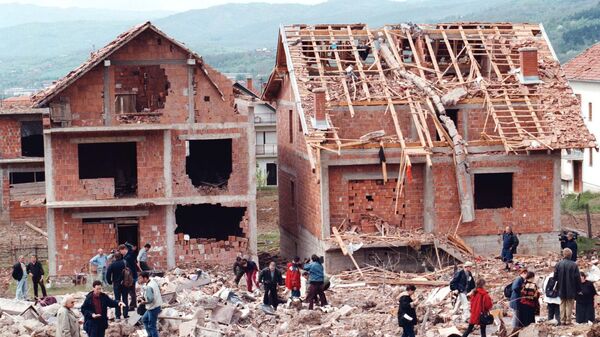It was then that it transformed from a "defensive organisation" into one that gave itself the right "on humanitarian grounds" to conduct military operations outside its own jurisdiction, disregarding the norms of international law.
After the end of the Cold War and the collapse of the Warsaw Pact, NATO representatives promised Russia that the Alliance would not expand eastward and retain its exclusively defensive character.
Serbian experts spoke to Sputnik about why back in 1999 it was so important for NATO to intervene in Yugoslavia's affairs and how this intervention was decisive for the further transformation of the Alliance. NATO lost its ability to exploit the old concept of protection from the USSR and its "satellite states" after the Cold War and was looking for an excuse to initiate a new doctrine of "humanitarian intervention".
"Despite the fact that NATO positioned itself as a defensive alliance, in essence, it was an aggressive pact from the very beginning, which is why the Warsaw Pact was established as a reaction to its formation. And after the collapse of the Warsaw Pact, the Alliance quickly showed its true face, immediately breaking its promise about the absence of intentions to expand east", the head of the Eurasian Security Forum, Major General Mitar Kovac said.
READ MORE: Kosovo War at 20: How Britain and America Backed Jihadists Throughout Conflict
Foreign relations expert and diplomat Zoran Milvojevic is convinced that no one questions why NATO gave Moscow false promises about its own plans: otherwise problems could arise in the process of German unification and explained why eastward expansion is so important for the Alliance:
"NATO is a tool for dominating and spreading Western influence. It turned out that such a military-political strategy most effectively allows controlling ‘occupied' territories and fully integrating them into the western sphere of influence. Therefore, the first criteria for EU integration is membership in NATO. Control and direct influence over the political system is most easily achieved by instruments of force", the Serbian diplomat said.
Kovac emphasised that in the end, we are talking about the fight for economic resources:
"The reason for NATO's constant expansion is in its economic interests. Behind the Alliance are the governments of Western countries and informal centres associated with large capital. The West has always sought to develop new markets and obtain new resources at the lowest possible prices. This is the very essence and logic of the existence of NATO".
READ MORE: Serbian Radical Party Protesters Burn EU, NATO Flags in Central Belgrade (PHOTO)
And the bombing of Yugoslavia, in this respect, was, according to Milvojevic, a necessary and inevitable link in the chain of NATO's transformation from a "defender" to an aggressive resource invader. He noted that, in addition to "occupying the territories of exceptional geostrategic importance", the Alliance had other goals in the Federal Republic of Yugoslavia:
"The aggression against our country was also needed in order leave behind the restraining framework of the North Atlantic Treaty, more precisely, its fifth article, suggesting mutual assistance of member states only in the event of an attack on one of them (Article 5: "armed attack against one" NATO member "shall be considered an attack against them all" — Sputnik). Also, do not forget that the bombing was the first time since the end of the Second World War when Germany took part in military action. In addition, the mechanism of the so-called ‘humanitarian intervention' that was later used in other countries was tested out on us".
Taking into account all of the above, Kovac argued that Yugoslavia could not escape the bombing:
"The then leadership did not want a war, they did not need it. And they did their best to avoid it. But at the same time, it is absolutely normal that it could not agree to a treaty that directly threatened the country's independence and control over its territory (The unacceptable conditions offered to Belgrade by Western mediators during the Rambouillet talks — Sputnik). These would have been concessions that no country would make in today's world. That is, everything was already decided, we were going to be attacked. And this aggression could not be prevented".
READ MORE: Crime That Won't Be Forgotten: 20th Anniversary of NATO Aggression in Yugoslavia
Zoran Milvojevic fully agrees with the military expert:
"We could have avoided [NATO] aggression only if we surrendered Kosovo, changed our political system and our stance on the world arena. This is noticeable even now: their goal was to crush the resistance of Serbs. If Serbia became completely dependent, in military and political terms, then the problem, according to NATO would have been solved".
The views and opinions expressed by the author do not necessarily reflect those of Sputnik.





